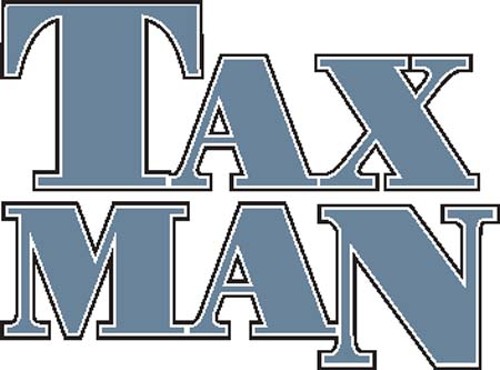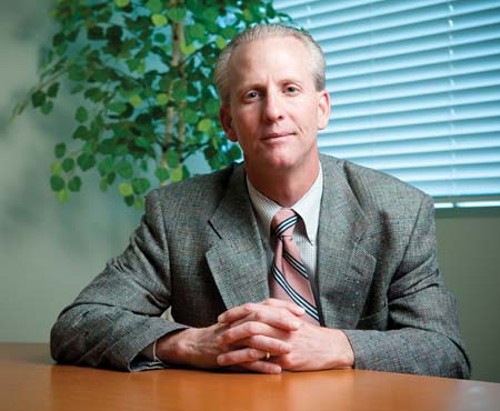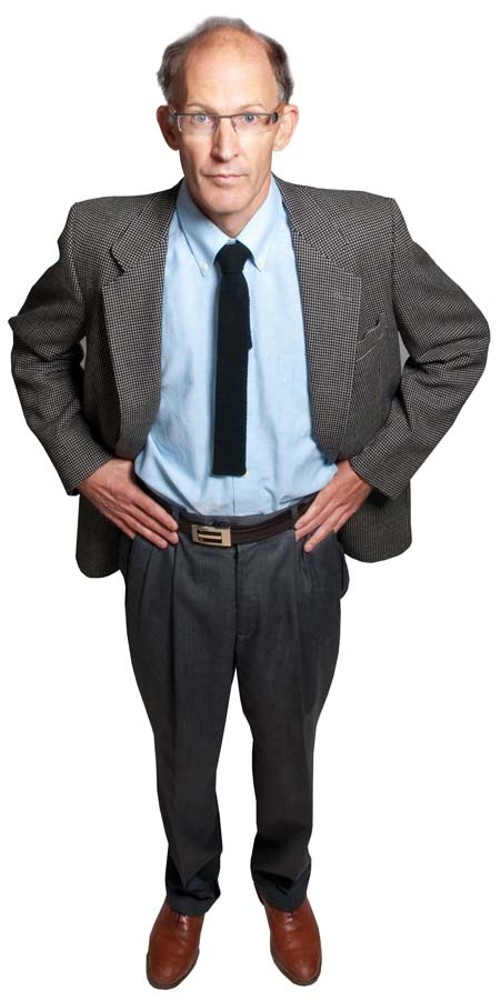The Tax Man
Playing Robin Hood for Utah's schools is only the latest puzzle passionate nerd Matt Frandsen is trying to solve.
By Eric S. Peterson @ericspetersonHe decided to spread his message to a larger audience by placing a $3,000 ad in Ogden’s Standard Examiner. The ad highlighted how Frandsen’s proposed code reform would take more taxes from millionaires to help the middle class.
“They put [the ad] right in the center of the financial pages,” Frandsen says with a chuckle. Not only was his populist message bordered by stock returns, but the image of his face was pixelated and distorted.
In politics, as with everything else, Frandsen has come up the hard way. Now, he’s fighting an uphill battle by campaigning on state income-tax reform. Translating the state’s tax code for the average voter makes Frandsen appear as either a visionary come down from the mountain with righteous spreadsheets carved in stone—or a lunatic. But that hasn’t deterred Frandsen from running on the tax issue against Jim Hansen in the 1st Congressional District in 2000 (the same year, he also played a significant role in getting Ralph Nader—then a Green Party candidate for president—on the Utah ballot). He later ran for the Democratic nomination for governor in 2008. Each attempt failed horribly.
If seeking office on a tax-reform platform seems like Mission Impossible, it wouldn’t be the first time that Frandsen set his sights on outlandish goals. He’s approached all of his life’s daunting tasks with a fiery passion, such as leaving his job as a chemical engineer to travel the world or hiking the 2,600 mile Pacific Crest Trail after reading a few camping articles in Outside magazine.
Now, as the leader of the RINGS TRUE (which stands for Re-establish Income tax based on New Graduated System for Tax Rebalancing & Upholding Education), he’s about to embark on the process of gathering 92,000 voter signatures to get his citizen initiative on the 2010 ballot.
Beyond fighting an uphill political battle, Frandsen has also struggled since 2001 with Parkinson’s disease. The illness, he says, is a sign that even his body can’t keep up with his frenetic drive.
Nervous Energy
Still, Frandsen keeps his drive in fifth gear, especially if he’s in a hurry.
When asked about his background in a phone conversation, Frandsen, who lives in Park City, warns a reporter that he needs to leave soon to pick up his 6-year-old daughter from school in Salt Lake City. Pressed for time, Frandsen gives a rapid-fire overview of his life. He grew up in Ogden, attended Weber State and University of Utah, and earned his master’s from Pennsylvania’s Villanova University. He went on to work on nuclear submarines in Pearl Harbor and at a Seattle refinery “Did the whole Eagle Scout thing when I was 13,” he rattles off in a stream of consciousness. “Skied Snowbasin, retired to my little cabin in Huntsville. I thought I’ll live on the interest of my savings like some Third World, indigenous whatever. Never owned a TV—that’s good, use that— real Americana, Horatio Algier-stuff right there,” he says with a quick chuckle.
Moments after hanging up, Frandsen sends an e-mail listing his favorite Internet videos: Performances of the Frank Zappa songs “A Pound for a Brown (on the Bus)” and “Be-Bop Tango (of the Old Jazzman’s Church),” Elvis Costello’s “(I Don’t Want To Go to) Chelsea,” and a video of the late extreme skier Shane McConkey doing double back flips off 4,000-foot high cliffs before releasing his parachute.
For Frandsen, the Zappa tunes strike a chord the same way tax reform does. “It’s like these dissident musicians who create this music,” Frandsen says. “It’s good, but you have to be in the right time and place for it.”
For anyone accustomed to formulaic pop beats, Zappa’s obtuse and meandering rhythms can be difficult to appreciate—but they’re music to Frandsen’s ears. In the same vein, he looks at his attempts to reform the tax code as “art.” But like listening to a Zappa tune, chances are you’re not going to understand Frandsen’s ideas the first time you consider them. Or the second.
By the Numbers
While
he’s generally an easy-going man, when Frandsen talks about his
passions, the velocity of his mind makes it hard for him to tone down
his nervous energy—discussions with him about tax codes are like
watching a calculator with a button stuck rapidly filling the screen
with numbers.
As he explains on his Website (UtahTax.org), to understand his tax reform platform, you need to know what was being reformed in the first place.
One of former Gov. Jon Huntsman Jr.’s crowning glories was seeing his 5 percent (erroneously described as a flat tax) personal income tax pass in 2007. The system went into effect in 2008, reforming the old tax code— which hadn’t been tinkered with since 1978.
Huntsman’s reform essentially lowered most Utahns’ personal income-tax rates, but Frandsen contends rates were not lowered equally across the board. Only “marginal” tax rates came down. In simple terms, marginal refers to taxes paid on your last dollar. If you’re a millionaire, for example, your first dollar earned is taxed ata different rate margin than your millionth dollar of income.
The old system had a marginal rate of 7 percent for almost all Utahns—whether they were bankers or fry cooks. Since the old code had not been adjusted for inflation in over two decades, most Utahns were taxed at the same marginal rate—at about 7 percent. Huntsman’s reform dropped that ceiling down to a maximum of 5 percent on the marginal rate—which would seem like win-win for everyone, right?
Wrong, Frandsen says. He sees the reform as mostly a handout to the wealthy. Because while the old marginal rate was 7 percent, nobody really paid that much because they could claim deductions and exemptions. But the current system has eliminated many personal deductions and replaced them with credits.
“The Huntsman reform achieved this sleight of hand by phasing out the personal exemptions and deduction enjoyed in the old tax code for decades,” Frandsen says. Doing this, he says, increases taxes for the middle class by 25 percent in comparison to the old system when they could take more deductions.
Frandsen is waiting to prove his case when the state’s 2008 income tax report is released. He anticipates the evidence will show the tax system effectively taxes the middle class more than it does the upper class.
Looking at the real tax rates, in 2006—when Huntsman’s single-rate reform bill was being debated—Utah taxpayers who made more than $10 million a year paid an effective rate of 5.4 percent. Frandsen anticipates that in 2008 their effective tax rate will be 4.4 percent. With the current system, Frandsen says, this equates to about a $32,000 tax break for these millionaires. “That’s roughly a $73 million reduction in public-education revenues given to the top one quarter of 1 percent of taxpayers!” Sen. Wayne Niederhauser, R-Sandy, one of the sponsors of the 2006 reform, says that, in general, the new reform lowered almost everyone’s taxes.
“Ninety-two percent of people saw some kind of decrease,” Niederhauser says. “The idea that this is a huge increase on the middle class is false.”
Frandsen’s latest petition—a fiscal note for the petition is currently being done through the State Elections Office—includes numbers run by the Utah State Tax Commission that compare his graduated income tax brackets against the current system.
Frandsen’s petition, in total, would boost revenues for public education by approximately $270 million, although those numbers are from the tax commission and are based on 2006 returns, when the economy was strong.
“The Huntsman reform achieved this sleight of hand by phasing out the personal exemptions and deduction enjoyed in the old tax code for decades,” Frandsen says. Doing this, he says, increases taxes for the middle class by 25 percent in comparison to the old system when they could take more deductions.
Frandsen’s petition takes more from the top earners, especially millionaires, who would pay an additional $240 million.
Unfortunately for Frandsen, playing Robin Hood with the tax code is not a very popular political move.
Performance Art
While now a die-hard
disciple of Ralph Naderstyle populism, Frandsen grew up in a
conservative household and lived by fiscally conservative standards.
Aside from incurring a small student loan, Frandsen followed his father’s advice and never borrowed money, which enabled him at the age of 30 to quit his job as a chemical engineer and travel the world. During his journeys, he made an excursion into Cuba, hiked the Swiss Alps and even watched the fall of the Berlin Wall from Munich.
He returned from that quest and worked another five years in the engineering field, all while saving money by living in a small cabin in Huntsville and paying no mortgage. At 35, he retired with more than $100,000 in savings and, within two years, set off to hike the entire length of the Pacific Crest Trail, despite having only camped a couple of times since his days as a Boy Scout. In fact, he says, “I still had my Boy Scout aluminum-frame backpack, which is what they had in 1968.”
Frandsen’s
own best analysis of his strange drives is that he is a “performance
artist” who plays out roles—whether he is an outdoors enthusiast, an
engineer or a political crusader. He has even spent a year constructing
a guest cottage on his property with his own hands. “It took me $50,000
to build, it’s completely abstract, beautiful clay on the inside walls
… obtuse angles and all this weirdstuff, and it worked! I built the thing!”
For as many adventures as Frandsen has embarked on, he’s had his share of misadventures, though he doesn’t regret them—he’s owned them. For example, Frandsen’s e-mail moniker is “Maserati Matt,” a nickname friends gave him after he purchased in 1993, on a whim, a 1969 Ghibli Maserati sports car. For a year following the purchase, he spent hours after work restoring it. He eventually sold it on eBay, in 2006, “for the amount I had put into it.”
While he is frugal by nature, he is not afraid to spend money on his passions. To that end, he says that he has spent about $25,000 of his own money on the taxreform petition. He earns about $35,000 annually through investment income and rental properties he inherited.
Another of Frandsen’s notable misadventures was a short-lived marriage. Frandsen married at 42 and, while he says he instantly realized it was a mistake, divorced six years later. As is par for Frandsen’s life, though, he says he now has a greater bond with his ex-wife as well as his young daughter he remains devoted to. “It’s very nice to throw out these grenades,” Niederhauser says of Frandsen’s swipes at the single tax rate.
But Frandsen’s current foray into public life baffles even him. “Politics is a dirty business,” he says. “I don’t know how I ever got into this. It’s so weird.”
Half Vast
Utah
Tax Review Commission Chair Keith Prescott, a downtown tax accountant
with extensive state tax-policy experience, is, like Frandsen, a fast
talker with a sharp mind. Unlike Frandsen, he’s seen how ugly it can be
to reform the tax code, having been a core member of a group that led
former Gov. Jon Huntsman Jr.’s tax reform effort.
Slipped under the glass cover on Prescott’s desk is a saying that seems telling in light of Frandsen’s goal to re-reform the tax code: “Never undertake a vast project with only a half-vast idea.”
Even though Frandsen and Prescott are on opposite sides of the issues, Prescott doesn’t dislike Frandsen. “He’s a nice guy,” Prescott says. “I just found him very set on what he wanted to do.”
What troubles Prescott, however, is that through the almost four-year process of the last reform, he never heard complaints from Frandsen or his supporters.
Prescott says he couldn’t offer a specific analysis of Frandsen’s 2010 projections from the Tax Commission, but, in general terms, he says, making a code that gathers more revenue by raising rates is hardly unique.
“There’s no magic here,” Prescott says.
“The trick is, how do you do enough analysis to know how it’s going to affect each segment of the population?” Having a stable, nonvolatile tax code is key, Prescott says.
Volatility, in simple terms, refers to the factor by which tax rates rise with increasing revenues during a good economy and likewise sink in a bad economy. States where tax rates ride a rollercoaster from one year to the next aren’t attractive environments for business, Prescott says.
“[Taxes] take from the production of the people, out of the engine that drives our economy.”
Niederhauser echoed these concerns, and says that reducing volatility was a key part of reform goals.
“It’s very nice to throw out these grenades,” Niederhauser says of Frandsen’s swipes at the single-tax rate. “But the thing they can’t argue with is that we need to have a rate that is competitive across the nation.”
So the question is: How big of a draw are personal income tax rates in attracting businesses to set up shop in Utah?
Bryant Howe, assistant director of the Office of Legislative Research and Counsel, sees income taxes as part of the big picture, but not a big part. “I don’t think it’s a major factor,” Howe says. [For more on Utah’s business development incentives, visit CityWeekly.net].
Frandsen, however, says that when an upswing is bringing in more revenue to the state, the state should save more of that cash in its “rainy day fund,” as opposed to lowering tax rates.
“The more volatile the system, the bigger the rainy day fund needs to be,” Prescott says. “But you can’t build it to be big enough to handle the whole thing.”
While Prescott disagrees with Frandsen’s petition, he agrees more should be put into the Rainy Day Fund. But, he says, there are other reasons why lowering rates is better than banking profits during flush economic years.
“Utah state government has grown the most in those good years, and it never shrinks,” Prescott says. “There’s a practical side to this: If you don’t think government should be the end all, be all, then you want to control the size of government. And in this state, that’s a very strong feeling.”
An Unreasonable Man
Activist
and watchdog Steve Erickson, a member of Frandsen’s tax coalition,
recalls being the “tax policy guy” in the late ’80s and early ’90s for
local nonprofit Utah Issues, a progressive anti-poverty group. “It was
frustrating enough that I decided to do something else,” Erickson says.
“Progress is slow around here for a progressive. But Matt has certainly
tilted at the windmill, and you’ve got to admire guys that do that.”
Tilting at windmills has played a role in Frandsen’s personal life as well. In fact, it was at a 2001 protest of the Free Trade of the America Areas conference in Philadelphia where Frandsen met his wife, Michelle.
“He’s very sincere and very earnest in his desire for economic justice,” Michelle, now divorced from him, says. Tax reform, she says, was a natural fit for Matt because he likes complex puzzles. “He really likes the idea of large systems and how you can affect them by tweaking some of the elements. That’s why the tax code has become so much of a focus for him.”
Michelle says it wasn’t his pursuits that divided the marriage. “He’s a great father and great husband, but as he got sick, his Parkinson’s really took so much of his effort and focus. He felt like the marriage really strained him.”
In 2007, Matt initiated the divorce, largely, he says, because of the guilt of burdening his wife with caring for his worsening condition.
Still, the couple enjoys a family life, Michelle says, proudly noting that their daughter Sophie still draws pictures of the family together.
Michelle even picks up on Matt’s influence in conversations she has with her daughter. “She talks about the economy in her own way,” Michelle says. “She’ll say: ‘You know, Mommy, your money’s gonna be bad one day, so you should really get some gold.’ That’s totally Matt!” Michelle says with a laugh.
A Beautiful Mind
“I used to have a sensation in my mouth of something expanding like the universe,” Frandsen says. “As I went to sleep at night, [there was] this incredible, vast emptiness behind my eyes … this expansion. Which is weird, right?” Back then, maybe. But looking at the expanse of roles Frandsen has played and his varied escapades, it may have just been his future adventures welling up inside him. From scientist to outdoors adventurer to political gadfly, Frandsen has donned many hats—but his latest performance as a professional agitator may have the most personal significance for him.
While Frandsen can count Ralph Nader as his political godfather, it was his real father who instilled in him a desire for justice. “He would hold people to the fire,” Frandsen says. “If he knew something was wrong, he would always confront somebody with it.”
A career architect with a few rental properties, Frandsen’s father kept no distance between a perceived wrong and letting the wrongdoer know their actions were unjust. Whether it was telling neighbors to turn down their music at night, confronting unscrupulous businessmen or even calling out his son on his high school beer drinking, his father never hesitated to right a wrong.
“I really looked up to him because he was pretty just,” Frandsen says, adding that he struggles to challenge injustice as easily as his father.
Ultimately, the strange universe inside Matt Frandsen seems to be set on a collision course with political realities. And it’s one that’s taking a physical toll on the intrepid reformer. “I think Parkinson’s comes from a neurological imbalance of trying to address authority,” he says.
“Personally, I did this tax work because I enjoy hard things,” Frandsen writes via e-mail. “But I also feel the pain, just like a bird that flies into a pane-glass window, when I realize the sudden truth.”
It’s ironic that an almost obsessivecompulsive desire to best obstacles could make one sick—or could even be considered sick behavior—especially when so few are willing to try and change the world.
“Have
you ever been hiking, where you go in, like, three miles, turn around
and come back out the same trail? Well, when I was a kid, I was always
called home. My parents would say, ‘Only go out for an hour.’ Well, I’d
get halfway to the peak and realize, ‘Oh, shoot, I’ve got to turn
back,’ and then I thought, ‘Maybe I’ll just push and go to the top.’
And then I would be three hours late getting back and be in big
trouble. I liked to have the adventure but never wanted to turn around
and come home,” he says. “It’s powerful stuff.”
More by Eric S. Peterson
-
The Secret Sauce
How Utah lawmakers disclose—or don't disclose—conflicts of interest.
- Feb 14, 2024
-
Police departments in Salt Lake County spent almost $20 million on civil rights complaints in the past decade
The Co$t of Mi$conduct
- Oct 18, 2023
-
Women decry harassment and toxic culture at St. George auto dealership
Men at Work
- Oct 11, 2023
- More »
Latest in Cover Story
Readers also liked…
-
Forget the family pedigree—Robert F. Kennedy Jr should not be the next president of the United States
Trojan Horse
- Jun 21, 2023
-
Women decry harassment and toxic culture at St. George auto dealership
Men at Work
- Oct 11, 2023









